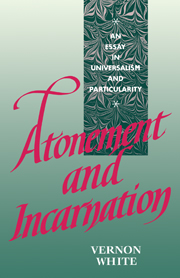Book contents
- Frontmatter
- Contents
- Introduction
- 1 The claim
- 2 On having lived too long and seen too much
- 3 The work of Christ (On trying to conceive how ‘things are not as they were’)
- 4 Two recent contributions
- 5 Creating an atonement model
- 6 The person of Christ (On trying to conceive how the Word became Flesh)
- 7 A moral demand: conditions for real reconciliation
- 8 Anthropocentricity, imperialism, and evangelism: an ethical postscript
- Notes
- Bibliography
- Index
3 - The work of Christ (On trying to conceive how ‘things are not as they were’)
Published online by Cambridge University Press: 21 September 2009
- Frontmatter
- Contents
- Introduction
- 1 The claim
- 2 On having lived too long and seen too much
- 3 The work of Christ (On trying to conceive how ‘things are not as they were’)
- 4 Two recent contributions
- 5 Creating an atonement model
- 6 The person of Christ (On trying to conceive how the Word became Flesh)
- 7 A moral demand: conditions for real reconciliation
- 8 Anthropocentricity, imperialism, and evangelism: an ethical postscript
- Notes
- Bibliography
- Index
Summary
In his book The Doctrine of the Atonement Leonard Hodgson claims that we need ‘an objective atonement wrought once for all by God in the history of this world, in virtue of which things are not as they were’. In other words, a particular event has constituted a widespread, if not universal, change in things. We have already noted that such a notion certainly belonged to traditional Christian claims for Christ: we have seen that New Testament images include the notion that potentially universal reconciliation is constituted ‘once-for-all’ by something as particular as ‘the shedding of his blood’; Gregory of Nyssa, Anselm, and Luther amongst others all echo this sort of assertion in their different ways. As Hodgson himself puts it, they see the atonement not as an illustration of an eternal truth, but as ‘something accomplished, something done’.
But it is precisely that variety of ways in which the claim is asserted which highlights a teasing problem. How is this accomplishment to be conceived? For every model of atonement which purports to explain its ‘mechanics’ is vulnerable to serious criticism. Moreover, there are sound reasons why such criticism has become more pressing than ever.
Maurice Wiles, as so often, is succinct in his summary of the point, actually quoting Hodgson himself to illustrate it.
- Type
- Chapter
- Information
- Atonement and IncarnationAn Essay in Universalism and Particularity, pp. 26 - 41Publisher: Cambridge University PressPrint publication year: 1991



